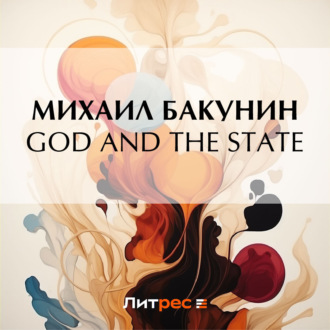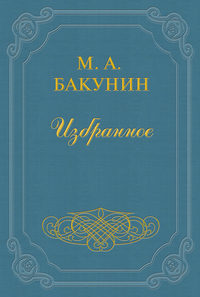 полная версия
полная версияGod and the State
Now, history is made, not by abstract individuals, but by acting, living and passing individuals. Abstractions advance only when borne forward by real men. For these beings made, not in idea only, but in reality of flesh and blood, science has no heart: it considers them at most as material for intellectual and social development. What does it care for the particular conditions and chance fate of Peter or James? It would make itself ridiculous, it would abdicate, it would annihilate itself, if it wished to concern itself with them otherwise than as examples in support of its eternal theories. And it would be ridiculous to wish it to do so, for its mission lies not there. It cannot grasp the concrete; it can move only in abstractions. Its mission is to busy itself with the situation and the general conditions of the existence and development, either of the human species in general, or of such a race, such a people, such a class or category of individuals; the general causes of their prosperity, their decline, and the best general methods of securing their progress in all ways. Provided it accomplishes this task broadly and rationally, it will do its whole duty, and it would be really unjust to expect more of it.
But it would be equally ridiculous, it would be disastrous to entrust it with a mission which it is incapable of fulfilling. Since its own nature forces it to ignore the existence of Peter and James, it must never be permitted, nor must anybody be permitted in its name, to govern Peter and James. For it were capable of treating them almost as it treats rabbits. Or rather, it would continue to ignore them; but its licensed representatives, men not at all abstract, but on the contrary in very active life and having very substantial interests, yielding to the pernicious influence which privilege inevitably exercises upon men, would finally fleece other men in the name of science, just as they have been fleeced hitherto by priests, politicians of all shades, and lawyers, in the name of God, of the State, of judicial Right.
What I preach then is, to a certain extent, the revolt of life against science, or rather against the government of science, not to destroy science – that would be high treason to humanity – but to remand it to its place so that it can never leave it again. Until now all human history has been only a perpetual and bloody immolation of millions of poor human beings in honor of some pitiless abstraction – God, country, power of State, national honor, historical rights, judicial rights, political liberty, public welfare. Such has been up to to-day the natural, spontaneous, and inevitable movement of human societies. We cannot undo it; we must submit to it so far as the past is concerned, as we submit to all natural fatalities. We must believe that that was the only possible way to educate the human race. For we must not deceive ourselves: even in attributing the larger part to the Machiavellian wiles of the governing classes, we have to recognize that no minority would have been powerful enough to impose all these horrible sacrifices upon the masses if there had not been in the masses themselves a dizzy spontaneous movement which pushed them on to continual self-sacrifice, now to one, now to another of these devouring abstractions, the vampires of history, ever nourished upon human blood.
We readily understand that this is very gratifying to the theologians, politicians, and jurists. Priests of these abstractions, they live only by the continual immolation of the people. Nor is it more surprising that metaphysics, too, should give its consent. Its only mission is to justify and rationalize as far as possible the iniquitous and absurd. But that positive science itself should have shown the same tendencies is a fact which we must deplore while we establish it. That it has done so is due to two reasons: in the first place, because, constituted outside of life, it is represented by a privileged body; and in the second place, because thus far it has posited itself as an absolute and final object of all human development. By a judicious criticism, which it can and finally will be forced to pass upon itself, it would understand, on the contrary, that it is only a means for the realization of a much higher object – that of the complete humanization of the real situation of all the real individuals who are born, who live, and who die, on earth.
The immense advantage of positive science over theology, metaphysics, politics, and judicial right consists in this – that, in place of the false and fatal abstractions set up by these doctrines, it posits true abstractions which express the general nature and logic of things, their general relations, and the general laws of their development. This separates it profoundly from all preceding doctrines, and will assure it for ever a great position in society: it will constitute in a certain sense society’s collective consciousness. But there is one aspect in which it resembles all these doctrines: its only possible object being abstractions, it is forced by its very nature to ignore real men, outside of whom the truest abstractions have no existence. To remedy this radical defect positive science will have to proceed by a different method from that followed by the doctrines of the past. The latter have taken advantage of the ignorance of the masses to sacrifice them with delight to their abstractions, which, by the way, are always very lucrative to those who represent them in flesh and bone. Positive science, recognizing its absolute inability to conceive real individuals and interest itself in their lot, must definitely and absolutely renounce all claim to the government of societies; for if it should meddle therein, it would only sacrifice continually the living men whom it ignores to the abstractions which constitute the sole object of its legitimate preoccupations.
The true science of history, for instance, does not yet exist; scarcely do we begin to-day to catch a glimpse of its extremely complicated conditions. But suppose it were definitely developed, what could it give us? It would exhibit a faithful and rational picture of the natural development of the general conditions – material and ideal, economical, political and social, religious, philosophical, æsthetic, and scientific – of the societies which have a history. But this universal picture of human civilization, however detailed it might be, would never show anything beyond general and consequently abstract estimates. The milliards of individuals who have furnished the living and suffering materials of this history at once triumphant and dismal – triumphant by its general results, dismal by the immense hecatomb of human victims “crushed under its car” – those milliards of obscure individuals without whom none of the great abstract results of history would have been obtained – and who, bear in mind, have never benefited by any of these results – will find no place, not even the slightest, in our annals. They have lived and been sacrificed, crushed for the good of abstract humanity, that is all.
Shall we blame the science of history? That would be unjust and ridiculous. Individuals cannot be grasped by thought, by reflection, or even by human speech, which is capable of expressing abstractions only; they cannot be grasped in the present day any more than in the past. Therefore social science itself, the science of the future, will necessarily continue to ignore them. All that we have a right to demand of it is that it shall point us with faithful and sure hand to the general causes of individual suffering– among these causes it will not forget the immolation and subordination (still too frequent, alas!) of living individuals to abstract generalities – at the same time showing us the general conditions necessary to the real emancipation of the individuals living in society. That is its mission; those are its limits, beyond which the action of social science can be only impotent and fatal. Beyond those limits being the doctrinaire and governmental pretentions of its licensed representatives, its priests. It is time to have done with all popes and priests; we want them no longer, even if they call themselves Social Democrats.
Once more, the sole mission of science is to light the road. Only Life, delivered from all its governmental and doctrinaire barriers, and given full liberty of action, can create.
How solve this antinomy?
On the one hand, science is indispensable to the rational organization of society; on the other, being incapable of interesting itself in that which is real and living, it must not interfere with the real or practical organization of society.
This contradiction can be solved only in one way: by the liquidation of science as a moral being existing outside the life of all, and represented by a body of breveted savants; it must spread among the masses. Science, being called upon to henceforth represent society’s collective consciousness, must really become the property of everybody. Thereby, without losing anything of its universal character, of which it can never divest itself without ceasing to be science, and while continuing to concern itself exclusively with general causes, the conditions and fixed relations of individuals and things, it will become one in fact with the immediate and real life of all individuals. That will be a movement analogous to that which said to the Protestants at the beginning of the Reformation that there was no further need of priests for man, who would henceforth be his own priest, every man, thanks to the invisible intervention of the Lord Jesus Christ alone, having at last succeeded in swallowing his good God. But here the question is not of Jesus Christ, nor good God, nor of political liberty, nor of judicial right – things all theologically or metaphysically revealed, and all alike indigestible. The world of scientific abstractions is not revealed; it is inherent in the real world, of which it is only the general or abstract expression and representation. As long as it forms a separate region, specially represented by the savants as a body, this ideal world threatens to take the place of a good God to the real world, reserving for its licensed representatives the office of priests. That is the reason why it is necessary to dissolve the special social organization of the savants by general instruction, equal for all in all things, in order that the masses, ceasing to be flocks led and shorn by privileged priests, may take into their own hands the direction of their destinies.7
But until the masses shall have reached this degree of instruction, will it be necessary to leave them to the government of scientific men? Certainly not. It would be better for them to dispense with science than allow themselves to be governed by savants. The first consequence of the government of these men would be to render science inaccessible to the people, and such a government would necessarily be aristocratic, because the existing scientific institutions are essentially aristocratic. An aristocracy of learning! from the practical point of view the most implacable, and from the social point of view the most haughty and insulting – such would be the power established in the name of science. This régime would be capable of paralyzing the life and movement of society. The savants always presumptuous, ever self-sufficient and ever impotent, would desire to meddle with everything, and the sources of life would dry up under the breath of their abstractions.
Once more, Life, not science, creates life; the spontaneous action of the people themselves alone can create liberty. Undoubtedly it would be a very fortunate thing if science could, from this day forth, illuminate the spontaneous march of the people towards their emancipation. But better an absence of light than a false and feeble light, kindled only to mislead those who follow it. After all, the people will not lack light. Not in vain have they traversed a long historic career, and paid for their errors by centuries of misery. The practical summary of their painful experiences constitutes a sort of traditional science, which in certain respects is worth as much as theoretical science. Last of all, a portion of the youth – those of the bourgeois students who feel hatred enough for the falsehood, hypocrisy, injustice, and cowardice of the bourgeoisie to find courage to turn their backs upon it, and passion enough to unreservedly embrace the just and human cause of the proletariat – those will be, as I have already said, fraternal instructors of the people; thanks to them, there will be no occasion for the government of the savants.
If the people should beware of the government of the savants, all the more should they provide against that of the inspired idealists. The more sincere these believers and poets of heaven, the more dangerous they become. The scientific abstraction, I have said, is a rational abstraction, true in its essence, necessary to life, of which it is the theoretical representation, or, if one prefers, the conscience. It may, it must be, absorbed and digested by life. The idealistic abstraction, God, is a corrosive poison, which destroys and decomposes life, falsifies and kills it. The pride of the idealists, not being personal but divine, is invincible and inexorable: it may, it must, die, but it will never yield, and while it has a breath left it will try to subject men to its God, just as the lieutenants of Prussia, these practical idealists of Germany, would like to see the people crushed under the spurred boot of their emperor. The faith is the same, the end but little different, and the result, as that of faith, is slavery.
It is at the same time the triumph of the ugliest and most brutal materialism. There is no need to demonstrate this in the case of Germany; one would have to be blind to avoid seeing it at the present hour. But I think it is still necessary to demonstrate it in the case of divine idealism.
Man, like all the rest of nature, is an entirely material being. The mind, the facility of thinking, of receiving and reflecting upon different external and internal sensations, of remembering them when they have passed and reproducing them by the imagination, of comparing and distinguishing them, of abstracting determinations common to them and thus creating general concepts, and finally of forming ideas by grouping and combining concepts according to different methods – intelligence, in a word, sole creator of our whole ideal world, is a property of the animal body and especially of the quite material organism of the brain.
We know this certainly, by the experience of all, which no fact has ever contradicted and which any man can verify at any moment of his life. In all animals, without excepting the wholly inferior species, we find a certain degree of intelligence, and we see that, in the series of species, animal intelligence develops in proportion as the organization of a species approaches that of man, but that in man alone it attains to that power of abstraction which properly constitutes thought.
Universal experience,8 which is the sole origin, the source of all our knowledge, shows us, therefore, that all intelligence is always attached to some animal body, and that the intensity, the power, of this animal function depends upon the relative perfection of the organism. The latter of these results of universal experience is not applicable only to the different animal species; we establish it likewise in men, whose intellectual and moral power depends so clearly upon the greater or less perfection of their organism as a race, as a nation, as a class, and as individuals, that it is not necessary to insist upon this point.9
On the other hand, it is certain that no man has ever seen or can see pure mind, detached from all material form, existing separately from any animal body whatsoever. But if no person has seen it, how is it that men have come to believe in its existence? The fact of this belief is certain, and if not universal, as all the idealists pretend, at least very general, and as such it is entirely worthy of our closest attention, for a general belief, however foolish it may be, exercises too potent a sway over the destiny of men to warrant us in ignoring it or putting it aside.
The explanation of this belief, moreover, is rational enough. The example afforded us by children and young people, and even by many men long past the age of majority, shows us that man may use his mental faculties for a long time before accounting to himself for the way in which he uses them, before becoming clearly conscious of it. During this working of the mind unconscious of itself, during this action of innocent or believing intelligence, man, obsessed by the external world, pushed on by that internal goad called life and its manifold necessities, creates a quantity of imaginations, concepts, and ideas necessarily very imperfect at first and conforming but slightly to the reality of the things and facts which they endeavor to express. Not having yet the consciousness of his own intelligent action, not knowing yet that he himself has produced and continues to produce these imaginations, these concepts, these ideas, ignoring their wholly subjective– that is, human – origin, he must naturally consider them as objective beings, as real beings, wholly independent of him, existing by themselves and in themselves.
It was thus that primitive peoples, emerging slowly from their animal innocence, created their gods. Having created them, not suspecting that they themselves were the real creators, they worshipped them; considering them as real beings infinitely superior to themselves, they attributed omnipotence to them, and recognized themselves as their creatures, their slaves. As fast as human ideas develop, the gods, who, as I have already stated, were never anything more than a fantastic, ideal, poetical reverberation or an inverted image, become idealized also. At first gross fetiches, they gradually become pure spirits, existing outside of the visible world, and at last, in the course of a long historic evolution, are confounded in a single Divine Being, pure, eternal, absolute Spirit, creator and master of the worlds.
In every development, just or false, real or imaginary, collective or individual, it is always the first step, the first act that is the most difficult. That step once taken, the rest follows naturally as a necessary consequence. The difficult step in the historical development of this terrible religious insanity which continues to obsess and crush us was to posit a divine world as such, outside the world. This first act of madness, so natural from the physiological point of view and consequently necessary in the history of humanity, was not accomplished at a single stroke. I know not how many centuries were needed to develop this belief and make it a governing influence upon the mental customs of men. But, once established, it became omnipotent, as each insane notion necessarily becomes when it takes possession of man’s brain. Take a madman, whatever the object of his madness – you will find that obscure and fixed idea which obsesses him seems to him the most natural thing in the world, and that, on the contrary, the real things which contradict this idea seem to him ridiculous and odious follies. Well, religion is a collective insanity, the more powerful because it is traditional folly, and because its origin is lost in the most remote antiquity. As collective insanity it has penetrated to the very depths of the public and private existence of the peoples; it is incarnate in society; it has become, so to speak, the collective soul and thought. Every man is enveloped in it from his birth; he sucks it in with his mother’s milk, absorbs it with all that he touches, all that he sees. He is so exclusively fed upon it, so poisoned and penetrated by it in all his being, that later, however powerful his natural mind, he has to make unheard-of efforts to deliver himself from it, and even then never completely succeeds. We have one proof of this in our modern idealists, and another in our doctrinaire materialists – the German Communists. They have found no way to shake off the religion of the State.
The supernatural world, the divine world, once well established in the imagination of the peoples, the development of the various religious systems has followed its natural and logical course, conforming, moreover, in all things to the contemporary development of economical and political relations of which it has been in all ages, in the world of religious fancy, the faithful reproduction and divine consecration. Thus has the collective and historical insanity which calls itself religion been developed since fetichism, passing through all the stages from polytheism to Christian monotheism.
The second step in the development of religious beliefs, undoubtedly the most difficult next to the establishment of a separate divine world, was precisely this transition from polytheism to monotheism, from the religious materialism of the pagans to the spiritualistic faith of the Christians. The pagan gods – and this was their principal characteristic – were first of all exclusively national gods. Very numerous, they necessarily retained a more or less material character, or, rather, they were so numerous because they were material, diversity being one of the principal attributes of the real world. The pagan gods were not yet strictly the negation of real things; they were only a fantastic exaggeration of them.
We have seen how much this transition cost the Jewish people, constituting, so to speak, its entire history. In vain did Moses and the prophets preach the one god; the people always relapsed into their primitive idolatry, into the ancient and comparatively much more natural and convenient faith in many good gods, more material, more human, and more palpable. Jehovah himself, their sole God, the God of Moses and the prophets, was still an extremely national God, who, to reward and punish his faithful followers, his chosen people, used material arguments, often stupid, always gross and cruel. It does not even appear that faith in his existence implied a negation of the existence of earlier gods. The Jewish God did not deny the existence of these rivals; he simply did not want his people to worship them side by side with him, because before all Jehovah was a very jealous God. His first commandment was this:
“I am the Lord thy God, and thou shalt have no other gods before me.”
Jehovah, then, was only a first draft, very material and very rough, of the supreme deity of modern idealism. Moreover, he was only a national God, like the Russian God worshipped by the German generals, subjects of the Czar and patriots of the empire of all the Russias; like the German God, whom the pietists and the German generals, subjects of William I. at Berlin, will no doubt soon proclaim. The supreme being cannot be a national God; he must be the God of entire Humanity. Nor can the supreme being be a material being; he must be the negation of all matter – pure spirit. Two things have proved necessary to the realization of the worship of the supreme being: (1) a realization, such as it is, of Humanity by the negation of nationalities and national forms of worship; (2) a development, already far advanced, of metaphysical ideas in order to spiritualize the gross Jehovah of the Jews.
The first condition was fulfilled by the Romans, though in a very negative way no doubt, by the conquest of most of the countries known to the ancients and by the destruction of their national institutions. The gods of all the conquered nations, gathered in the Pantheon, mutually cancelled each other. This was the first draft of humanity, very gross and quite negative.
As for the second condition, the spiritualization of Jehovah, that was realized by the Greeks long before the conquest of their country by the Romans. They were the creators of metaphysics. Greece, in the cradle of her history, had already found from the Orient a divine world which had been definitely established in the traditional faith of her peoples; this world had been left and handed over to her by the Orient. In her instinctive period, prior to her political history, she had developed and prodigiously humanized this divine world through her poets; and when she actually began her history, she already had a religion ready-made, the most sympathetic and noble of all the religions which have existed, so far at least as a religion – that is, a lie – can be noble and sympathetic. Her great thinkers – and no nation has had greater than Greece – found the divine world established, not only outside of themselves in the people, but also in themselves as a habit of feeling and thought, and naturally they took it as a point of departure. That they made no theology – that is, that they did not wait in vain to reconcile dawning reason with the absurdities of such a god, as did the scholastics of the Middle Ages – was already much in their favor. They left the gods out of their speculations and attached themselves directly to the divine idea, one, invisible, omnipotent, eternal, and absolutely spiritualistic but impersonal. As concerns Spiritualism, then, the Greek metaphysicians, much more than the Jews, were the creators of the Christian god. The Jews only added to it the brutal personality of their Jehovah.









